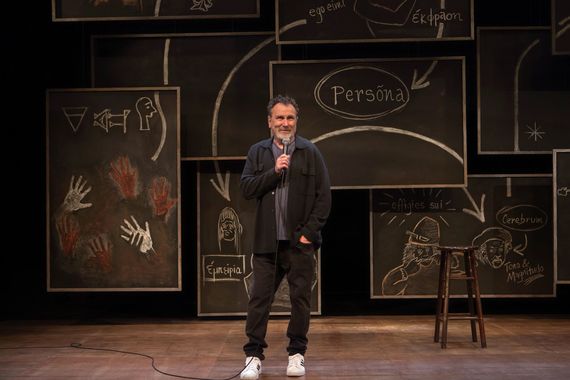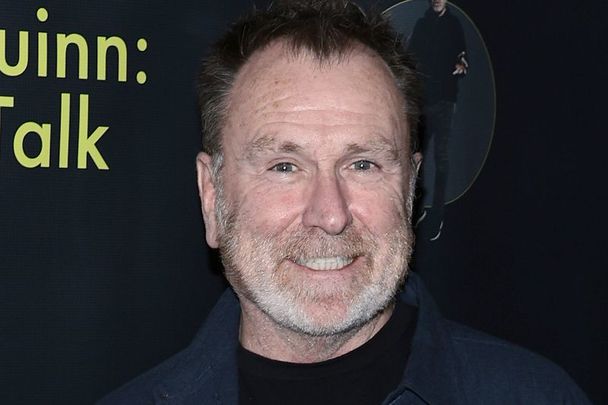It's not just you, things really have gotten weird out there. Thanks to social media, political gridlock, pandemic lockdowns, and our very halting return to normality, we are all a bit on edge these days.
So when I went to see Colin Quinn's new show "Small Talk" off Broadway, I was expecting to laugh about it – and I certainly did - but I did not expect to be moved and in a real sense helped by the sight of someone else confronting the same modern disconnects that I am myself.
“I mean, I feel like it's fake, like almost like everybody's kind of living like an advertising campaign to themselves, rather than being themselves,” Quinn, 63, tells IrishCentral.
“But I feel like the fun was drained away long before this. I feel like COVID is just a symptom. There's something that's very artificial about everything and everybody right now and one thing that's really changed here is small talk."
(Quinn has called his new off-Broadway show "Small Talk" to make that point).
“I feel like people have lost the skill of it, and how important it is in their life,” he says.
On both the left and the right these days, there are legions of angry inquisitors ready to police the political boundaries and prevent all dissent, but in the process, they suck so much of the humor, empathy, and fun out of our daily social lives, Quinn believes.
Why does he think this has happened, I ask.
“I don't know. But there's something strange going on. I think if you put in the position of benign dictator for a couple of years I believe I can get to the bottom of it, after much spilled blood of course, but this is how it has to be.”
This is the kind of crack that enrages many of his unaware followers online, who can't hear his obvious irony because sadly they live in a world where it no longer exists. Does he believe there's a new joyless new kind of inquisition going on? Do we now live in a world where you have to adopt all the new orthodoxies or screw you, you're canceled?
“Absolutely. And it's really a constant thing. I just put a new thing in the show. The only people that are left to speak honestly now are the stupid people.”
Is this kind of big cultural shift making his job harder, I ask. Part of the job of the comedian is to go to those places of tension and unease and sort of jump up and down on them after all. But there's also a sense now of why bother, the American Empire is already over he says in his show. He actually says onstage that the Empire has fallen, is that what he believes?
“Yeah, and it doesn't matter. I mean who the hell wants to be the Empire? There's a lot of pressure to be the Empire. We're so used to thinking like, we gotta be number one. I mean, if we're not now, and won't be in the future, who cares? Once you're number one, everybody just keeps asking you for sh-t? So in some ways, it's better not to be number one.”

Colin Quinn back on stage in "Small Talk."
When you're looking out at your audience each night, they're all wearing masks now, because of the situation that we're still in, does that play into what you're doing on stage?
“Well, I mean, I don't really feel like it affects me as much as it probably should. I'm still in the same delusional state that I always was about dying. At first I was like, 'Oh, sh-t, this is serious,' but it didn't take long for that to dissipate, you know? I guess I thought for a week or two when it started that it was going to transcend petty politics and all that kind of stuff. But they came right back amazingly quickly.”
In the show, Quinn hilariously reflects on what happened after he had a heart attack in 2018. In particular, he recalls, with deep embarrassment, what he said when it struck. Here's a clue, it was the m-word that rhymes with trucker.
“I really should have memorized like a Yeats poem or something a little more profound,” he deadpans.
If anxiety is the Irish lifeblood – and in many ways that's undeniable – being funny in the face of the worst is too. Irish people are naturally gifted in the art of small talk and being funny in almost any situation because they remember what it's for, Quinn says.
“Personally I think I'll never be as funny as an Irish-born 19-year-old girl. I was at a hotel in Dublin, my wife and I this year, and I walked into the hotel restaurant. And some young girl was behind the counter, just 19 years old, just waiting there and I go, 'I want the finest table in this place.' And she replies instantly, 'You deserve no less.' And then I go, 'my wife will be joining me,' and she replies, 'and she's a lucky woman.' Irish people have not forgotten the art of how to talk to people, or how to be funny, the way the world has.”
After growing up in Ireland, the women you meet elsewhere don't always seem as vivid, I say.
“Oh definitely, my mother and her sisters all had dark red hair. And when they'd get together all you'd see was dark red hair. And it was just very animated, very verbal, and very forthright, like they said what was on their mind, you know?”
In Ireland small talk is still a big thing, I explain. It's considered an important social skill, it's also considered egregiously rude if you won't talk to anyone. It's actually one of the worst things that can be said about someone. Because what's behind that aloofness it is the failure to connect. And that's what's happening almost everywhere else nowadays, right?
“And if you don't connect, you're also not acknowledging that you're equal. And as we both know, for the Irish there's nothing worse than somebody who thinks they're better than somebody else. And that's what small talk does, it says we're equal.”
What makes his show Irish, I ask.
“A true Irish show should make you laugh and then feel horrible,” he replies, with the kind of deadpan that can only come from within the tribe itself.
What else makes you Irish? “Well as a true person of Irish extraction, I don't like compliments. When an Irish woman is complimented by her husband for being beautiful, her response is usually to tell him to shut up.”
"Small Talk" by Colin Quinn is now playing at the Lucille Lortel theatre off-Broadway. For tickets visit: colinquinnshow.com




Comments